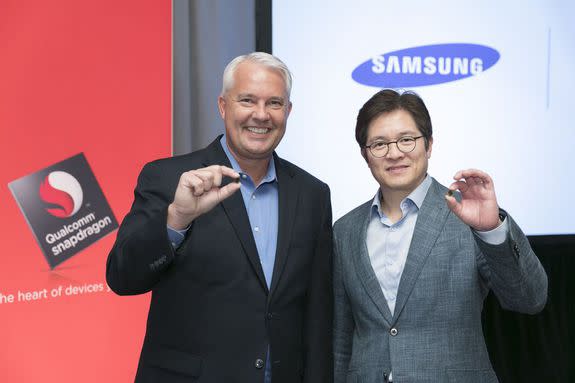This is the chip that will power every premium Android phone in 2017

Get ready to hear this one phone spec over and over again in 2017 because it'll tell you if your next Android phone is the best or not.
Qualcomm, maker of the chips (technically systems-on-chips, or SoCs) that power most of the world's Android phones, has just announced its next flagship chip, the Snapdragon 835.
SEE ALSO: 7 tips for capturing high-quality photographs with your smartphone
Samsung will produce the Snapdragon 835 using its 10-nanometer processor, a shrinkage down from the 14-nanometer process used in Qualcomm's current top-of-the-line 820/821 chips; the first premium phones to use the 835 will arrive in the first half of 2017.
The 10-nanometer technology will bring with it a 27 percent boost in performance and up to 40 percent lower power consumption, according to Qualcomm.
Additionally, the 835's smaller physical footprint will free up some space in a phone's already tightly packed internals for other features such as a larger battery or thinner design.

Image: Qualcomm
The 835 will also support Qualcomm's newly announced Quick Charge 4.0 technology, which will allow faster charging (up to 20 percent quicker); 15 minutes of charging will provide up to 50 percent battery life and five minutes of charging time will provide up to five hours of usage time.
"Using the new 10-nanometer process node is expected to allow our premium tier Snapdragon 835 processor to deliver greater power efficiency and increase performance while also allowing us to add a number of new capabilities that can improve the user experience of tomorrow’s mobile devices," says Keith Kressin, Qualcomm's senior vice president of product management.
With the 835 chip, Qualcomm hopes to build off the successes of the 820 and 821 chips that dominated this year's flagship phones, from the Galaxy S7 to the LG V20 to the new Google Pixels. The 820's excellent performance and power management stand in stark contrast to the issues that plagued the previous 810 chip, which had notable thermal issues and single-handedly ruined some phones like the HTC One M9.
Assuming the 835 has no thermal issues, next year's Android phones will be screamers with longer-lasting battery life — a definite win for consumers.

 Yahoo News
Yahoo News 